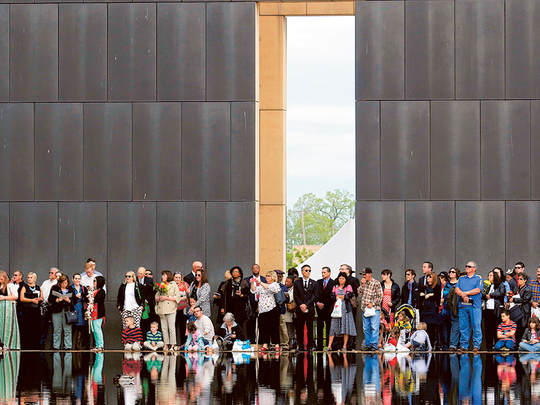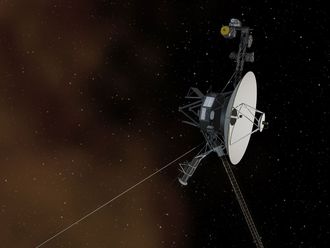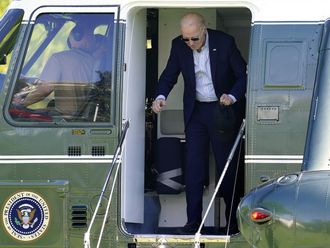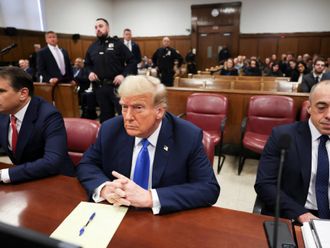
Oklahoma City: Twenty years to the hour after a homemade bomb gutted this city’s federal office building, killing 168 people and a nation’s complacency about terrorism, a delegation led by former President Bill Clinton gathered here Sunday to honour the dead and to celebrate the city’s resilience.
Assembled on the footprint of the former Alfred P. Murrah Federal Building, now a loblolly-pine-shaded memorial, a parade of leaders — including Oklahoma Governor Mary Fallin — offered repeated tributes to Oklahomans’ response to the tragedy, citing a construction worker who gave his boots to rescuers and schoolchildren who donated their pennies for aid.
Civic leaders have sought to label the selfless response to the bombing as the Oklahoma Standard — a brand, they say, that seeks to turn the horror of the bombing into a force for continuing good. Some say the tragedy united citizens in a way that propelled an economic renaissance and a rebuilding of Oklahoma City’s downtown as well.
But it fell to Clinton, whose speech here 20 years ago at a memorial service began a turnaround in what was a flailing presidency, to underscore the true significance of this anniversary.
“I prepared for this day yesterday, in New York, by taking Hillary to see our daughter and son-in-law and my about-to-be 7-month-old grandchild,” he said. “And Hillary and I bathed her and fed her and put her to bed, and I looked at her in that crib so I could remember how you felt, those of you who lost your loved ones.”
Nineteen children, most of them in a day care centre for federal employees in the Murrah Building, were among the 168 victims of the April 19, 1995, bombing. The memorial to the bombing includes 168 stylised chairs to commemorate those who were killed; balloons and teddy bears decorated some of the smaller ones among the roses and sprays of flowers on them Sunday.
The Oklahoma City bombing was quickly traced to Timothy J. McVeigh, a militia sympathiser with strong anti-government views, who had loaded a rental truck with a bomb made of more than 4,800 pounds of nitrate fertiliser and parked it in front of the building. The resulting explosion demolished a third of the federal building and damaged hundreds of other structures in 16 surrounding blocks.
“This was a place of unspeakable horror and tragedy,” Frank Keating, who was the governor at the time of the attack, said on Sunday.
McVeigh said he had carried out the bombing in retaliation for the April 19, 1993, standoff between the Branch Davidians and FBI agents at the sect’s compound in Waco, Texas, which left more than 80 people dead.
McVeigh was found guilty in 1997 and executed on June 11, 2001, at age 33 at a federal prison in Terre Haute, Indiana. A co-conspirator, Terry Nichols, was sentenced to life in prison. A third conspirator, Michael Fortier, received a 12-year term and was released from prison in 2006.
It was the largest act of domestic terrorism in the nation’s history and, until September 11, 2001, the largest act of any kind of terrorism in the country.
At Sunday’s ceremony, local and federal leaders at times heaped an embarrassment of congratulations on Oklahomans for their handling of the attack and the civic rebound that followed.
Clinton tied the city’s downtown development and a “breathtaking increase in per capita income” to its adherence to the Oklahoma Standard, though a booming oil and gas industry probably scored an assist.
The director of the FBI, James B. Comey, told the audience that “you were strong, you were unbending, you were fearless in the face of terrible hatred.”
But the congratulations were forgotten when the speeches ended and a procession of people took to the lectern to slowly read the list of the 168 dead, sometimes with quavering voices, sniffles or silences that belied a struggle to hold back tears. Some merely recited names, while others added adjectives: “my daughter and her unborn son,” “our dad,” “my mother,” “our big sister,” “our grandma and my aunt.”
“My baby,” said one woman, who fought a valiant battle to get those two words out. Later, Clinton held her hand.
Oklahoma, he said, may have emerged from tragedy stronger and more prosperous than ever.
“But the material gains were incidental,” he added. “Every family here who lost someone would give it all up in a heartbeat to have their loved ones back.”












